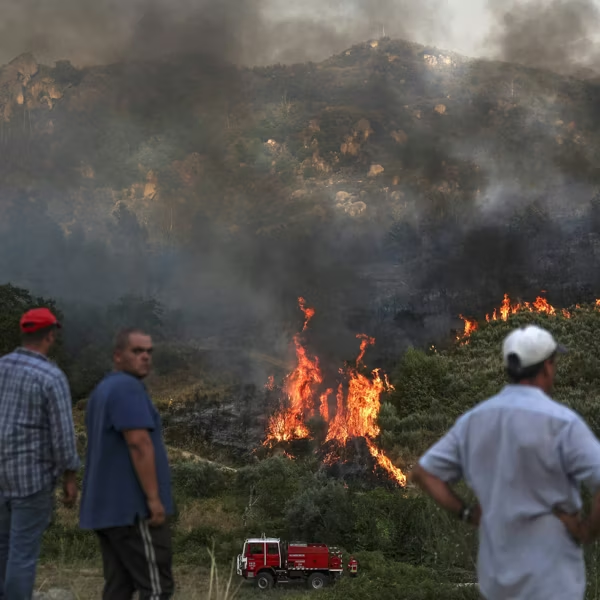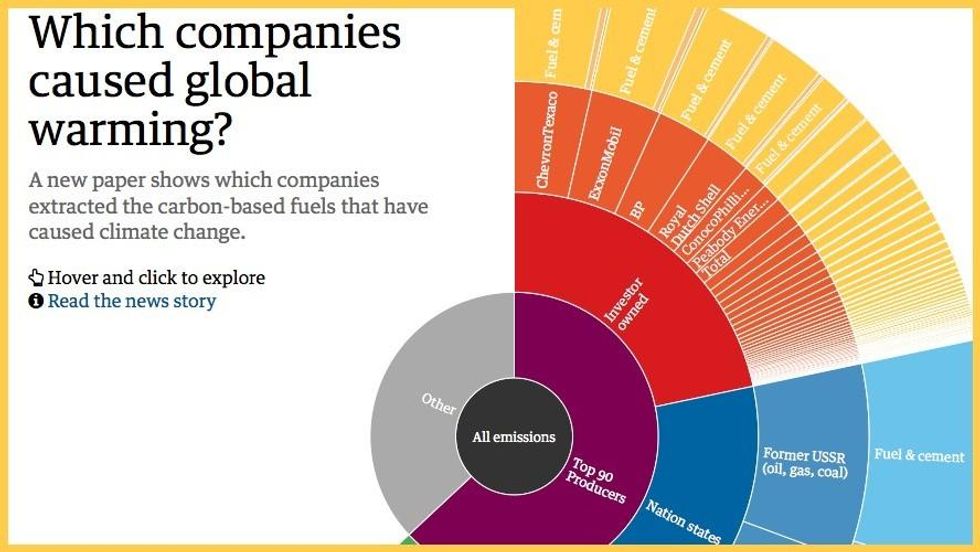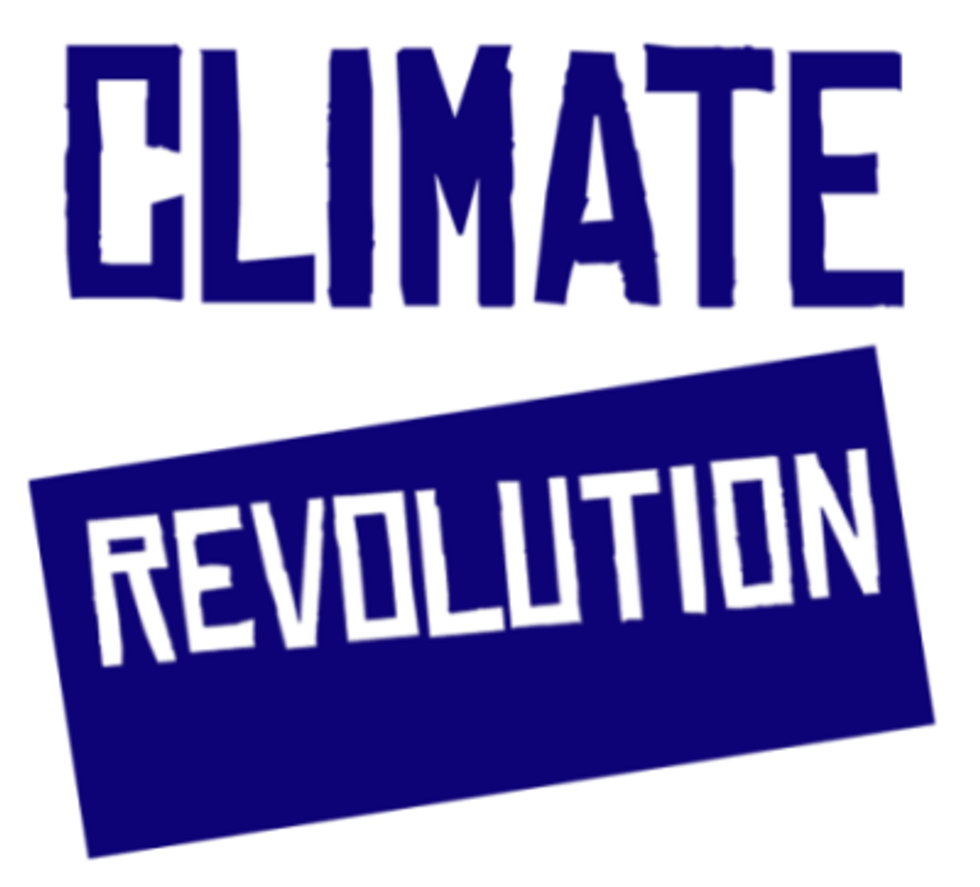Narrow it down to the real power-brokers and decision-makers--the CEO's of fossil fuel companies or the energy ministers from the largest petro-states--says climate researcher Richard Heede, and the actual individuals most responsible for the political world's continued refusal to address the planetary crisis of climate change "could all fit on a Greyhound bus or two."
In a newly compeleted study by Heede and his colleagues at the Climate Accountability Institute, their analysis shows that a mere 90 companies, some private and some state-owned, account for a full two-thirds of all greenhouse gas emissions that are now driving perilous rates of global warming.
Offered in advance to the Guardian newspaper, which created an interactive representation of the study's findings, the report comes as climate negotiators from around the world continue talks in Warsaw, Poland this week in the latest (what looks so far like a failed) attempt to solidify an emissions agreeement designed to stave off the worst impacts of climate change this century.
As the Guardian's Suzanne Goldenberg reports:
Between them, the 90 companies on the list of top emitters produced 63% of the cumulative global emissions of industrial carbon dioxide and methane between 1751 to 2010, amounting to about 914 gigatonne CO2 emissions, according to the research. All but seven of the 90 were energy companies producing oil, gas and coal. The remaining seven were cement manufacturers.
The list of 90 companies included 50 investor-owned firms - mainly oil companies with widely recognised names such as Chevron, Exxon, BP , and Royal Dutch Shell and coal producers such as British Coal Corp, Peabody Energy and BHP Billiton.
Some 31 of the companies that made the list were state-owned companies such as Saudi Arabia's Saudi Aramco, Russia's Gazprom and Norway's Statoil.
Nine were government run industries, producing mainly coal in countries such as China, the former Soviet Union, North Korea and Poland, the host of this week's talks.
Though the global public has been flooded with one scientific research paper after another warning of the perils of not addressing the role of carbon emissions, experts agree that the political will on the state, national, and global level has simply not been created.
The reason for that, of course, is the stranglehold that the very profitable fossil fuel companies--whether state-owned entities or private corporations--retain on the political systems within which they operate. At the global level, that political system is known as the United Nations, but so far the talks taking place in Warsaw are seeing almost no progress on a deal. On Wednesday, the world's poorest nation's walked out of the COP19 talks and the wealthiest nations--including the US, Canada, Australia, and the EU states--showing less and less courage despite the increasingly dire warnings from experts and scientists.
Michael Mann, a U.S. climate scientist who spoke to the Guardian about the possible impact of the list, said he hoped it would bring greater scrutiny to the gas, oil and coal companies who are most responsible for past emissions because these are the same companies poised to continue burning the vast carbon reserves still in the ground. "What I think could be a game changer here is the potential for clearly fingerprinting the sources of those future emissions," he said. "It increases the accountability for fossil fuel burning. You can't burn fossil fuels without the rest of the world knowing about it."
And Al Gore added: "This study is a crucial step forward in our understanding of the evolution of the climate crisis. The public and private sectors alike must do what is necessary to stop global warming. Those who are historically responsible for polluting our atmosphere have a clear obligation to be part of the solution."
The alternative, however--as almost zero progress, and possibly lost ground, has been the result of the last several rounds of international climate talks--is a global uprising from below, led by social justice organizations, environmentalists, and civil society who are willing to act where governments and the private sector have refused.
As Michael T. Klare, an energy expert and professor at Hampshire College, wrote earlier this week at TomDispatch:
If, as is now the case, governments across the planet back an extension of the carbon age and ever increasing reliance on "unconventional" fossil fuels like tar sands and shale gas, we should all expect trouble. In fact, we should expect mass upheavals leading to a green energy revolution.
None of us can predict the future, but when it comes to a mass rebellion against the perpetrators of global destruction, we can see a glimmer of the coming upheaval in events of the present moment. Take a look and you will see that the assorted environmental protests that have long bedeviled politicians are gaining in strength and support. With an awareness of climate change growing and as intensifying floods, fires, droughts, and storms become an inescapable feature of daily life across the planet, more people are joining environmental groups and engaging in increasingly bold protest actions. Sooner or later, government leaders are likely to face multiple eruptions of mass public anger and may, in the end, be forced to make radical adjustments in energy policy or risk being swept aside.
In fact, it is possible to imagine such a green energy revolution erupting in one part of the world and spreading like wildfire to others. Because climate change is going to inflict increasingly severe harm on human populations, the impulse to rebel is only likely to gain in strength across the planet. While circumstances may vary, the ultimate goal of these uprisings will be to terminate the reign of fossil fuels while emphasizing investment in and reliance upon renewable forms of energy. And a success in any one location is bound to invite imitation in others.
______________________________________________________





